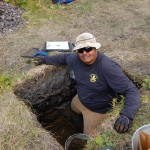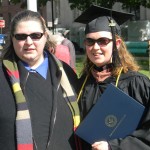It is graduation season. Pictures are popping up all over the internet of people who have walked the stage in accomplishment of achieving their educational goals. According to the National Center for Education Statistics (NCES), it is estimated that approximately 1,855,000 students will graduate in 2015 with a Bachelor’s degree.The Institute of Education Sciences states that “18.0 million students are expected to enroll in undergraduate programs and about 3.0 million will enroll in post-baccalaureate programs.” The higher learning academic machine continues to see an increase in students signing up for college, and an increase in students striving for the end goal of a graduating with a degree in hand.
Years of study and college classes lead to more than just a diploma or certification. The ritual of completion is a part of many individual’s journey to celebrate achievement, and this is seen in many areas of spirituality as well. Within the modern Pagan community we have seen a wealth of achievement or milestone based ceremonies, such as dedications, initiations, cronings or sagings, unions, and even the celebration of womanhood when a lady gets her menses. These celebrations show us that the ritual act of setting intentions, celebrations and acknowledgements are often done inside a ritualistic process.
The choice to participate in the activities of commencement is an individual one, and there are always people who decline. However, the majority of those that do participate are doing so in a highly ritualized way that initiates them into the world of academics. The ritual song, the long walk, the wait, the outfit and regalia, the turning of the tassel or placement of the hood for Master’s and doctorates, all of these are symbolic and important elements to creating the magic of the moment.
My personal journey to this point in my life was one layered with a lot of excitement, concerns, and questions. Walking the stage June 12 left me with wondering how this process felt for others who were approaching the graduation stage of their academic journey, and how the ritual of this ceremony felt for them. I reached out to several Pagans who have recently graduated with a degree of higher education to ask them some questions about their experiences.
I received my Associate of Science degree in Network Systems Administration, which falls under the (very large) umbrella of Computer Science. I did attend the graduation ceremony because it symbolized a very large milestone both personally and to my family. Being the first person in my immediate family to complete an educational level above high school, I wanted to do the walk, be handed the diploma—get the whole experience. It was something I wanted to share with my wife and my parents/in-laws as well.
Part of the importance of the ritual is acknowledging the work which has been put into the process. Another part is the physical manifestation (diploma) which acts as a sort of reward. The experience was quite inspiring, and I gained a lot of momentum which will be used to achieve future milestones. Bachelor’s degree, definitely. And maybe a Master’s? – Chris Williams
Graeme A. Barber
I graduated with an Associate Degree of Arts, with Distinction. My emphasis was in Environmental studies, and the bulk of my studies was in archaeology and physical geography. This was awarded to me by Okanagan College, in British Columbia, Canada.
I participated in my commencement ceremony because in a society as bereft of milestone and changes in life rituals as ours are here in North America, it’s important to participate in events like this. There was also a strong family component in my decision. The importance of the ritual was recognition, not just from peers, but from larger society. There was also the aspect that I was one of the few POC in my programme, and there is something important in “showing the flag” as it were. Supporting my transition forward to the next phases of my education, participation showed that I consider myself a part of the academic world, not apart from it, which again, is an important message to send. – Graeme A. Barber
Rose Quartz
I graduated with my Master of Arts degree in Education with an emphasis in Teaching and my Single Subject teaching credential in English. I was in an accelerated program and only had one year of graduate school because I started on it while also doing my Bachelor of Arts in English with an emphasis in Creative Writing. This is one of the main factors behind participating in my second commencement in two years at Mills College. I am heavily invested in and involved with the Mills community. Many of the other grad students in the Education program did not attend, but all 10 of us in the accelerated program participated.
The sense of community I derived from my program colleagues and from my extended networks at Mills – including the Mills Pagan Alliance – made participating important. It was a time I got to share with friends and family, and a tangible recognition of five long years of difficult, rewarding work. I saw this ritual as one which was both for me and for those I call my extended family to recognize and celebrate my academic successes.
The event marks a beginning of my chosen career – I am now considered qualified to teach, and the next school year will start with one major difference. No longer at Mills, this coming year will see me stepping into the role of teacher instead of continuing as a student in an academic setting. Life-long learner that I am, I know this is hardly the end of all my knowledge-gathering, but there is a certainty that comes with walking across the stage, that once you reach the other side you cannot walk backwards. At the end, I felt like I was truly done with one phase of my life and prepared to go into the next stage of learning. – Rose Quartz
Ryan Smith
I graduated with distinction with an MA in World History with a regional focus on the Middle East and a thematic focus on Urban History. I did not participate in my commencement ceremony due to some stupid red tape reasons that resulted in me getting my financial aid necessary for paying for graduation in time to walk after the deadline. I didn’t really have a choice on that question as by the time I was able to pay my graduation fees it was already too late to be one of the people walking. – Ryan Smith.
Katie Thackrey
I got my Bachelor of science in psychology.Yes, I participated in commencement because I didn’t want to regret not doing it later.
There was the idea that life is made up of experiences and I should have as many as possible. I felt it was important to solidify in my mind what I had accomplished; I don’t think I would have truly recognized the amount of work and how much of an accomplishment it is without the ceremony. The ceremony evoked immense feelings of gratitude for all those who gave their support, knowledge, and patience along the way. – Katie Thackrey
Katrina Ray-Saulis
My degree is a BFA in Creative Writing. I did attend graduation. I completed my coursework in December so I had already been a graduate for many months before the ceremony, but there was a sense of accomplishment that came from attending that I didn’t get during the months in between the last day of classes and graduation.
It’s possible that I may have received that sense of accomplishment when I got my physical diploma, I’m really not sure. But the head of the writing department has been pivotal in my graduation. She was a deciding factor in me attending that school, she’s been an incredible mentor, and she’s helped me in so many ways. I wouldn’t give up that moment when she traded me my diploma for a hug for anything. I wasn’t going to go to graduation at all until another professor told me how much it meant to the department head to see her students march. I’m heading into grad school in the spring of 2016 and my eventual goal is to teach. I think attending the ceremony helped me to see what I have to look forward to as a teacher more than anything else. – Katrina Ray-Saulis
My degree will be in sociology (Ph.D.), if I complete all requirements by end of August 2015. I did NOT participate in the commencement ceremony for two main reasons: 1) I wasn’t far enough along with completing deliverables for finishing in order to walk; 2) disconnect with my field and specific school of study.
We are a small program within the School of Nursing (incoming class for Fall 2015 has 3 students).[I] did not pursue walking in the school commencement ceremony because 75%+ of graduates are Master’s-level nurses whose courses and fieldwork don’t overlap with ours. Also [I] chose not to walk in the commencement ceremony at the university level because the various schools (Pharmacy, Dental, Grad Division, Nursing, etc.) function independently of each other. Since we also don’t have an undergrad study body, there is even less interaction between schools. – Mary Gee
I participated in my commencement ceremony, though I won’t technically graduate until Summer quarter – but once I get my thesis published, I’ll have an M.A. in Communication.
There’s a bit of backstory to why I wanted to walk for my M.A.. I got my B.A. from the same university, but the day that I walked, nobody showed up for me. I had the other students in the department, but everyone else who said they were going ended up as a no-show. So when I decided I was going to walk for my M.A., I initially planned on doing it just for me. After everything I had gone through to get the M.A., I felt I deserved to do something to acknowledge that. But a number of my friends (who had heard the story about my B.A. commencement more than once) got together and were there for my M.A. It definitely helped heal the wound left over from feeling abandoned on the previous commencement walk.
I will admit, I have a bit of an anti-authoritarian streak. I participated in the ceremony because it’s one of the pieces that helps confirm my achievement, but when they put the hood on me… it didn’t have the impact I’m sure they were aiming for. For me, it was a total stranger doing that, someone who had no idea of who I was, what I had done, or everything I’ve gone through in pursuit of my M.A. I’d much rather have been hooded on the other side of the stage, because at least over there one of the faculty I know was helping with the process. It may be more accurate to say, however, that I place more importance on established connections with other people than authority figures. As I said, however, this is just one piece of the whole that is my graduation, and I’m still glad I went through it. – Dee Shull
Many factors and red tape go into the final act of walking the stage, but that very act of crossing the stage gives many grads a sense of completion, accomplishment and recognition to go along with the diploma that will be received. While some people do not feel the need to go through this ritual or were unable to, others find that commencement is a very important part of the academic process.
It is not uncommon within many modern Pagan practices to believe that the symbols and practices of our ceremonies increase in power with repetition over time, and that lineage and acknowledgement from our community of elders has great meaning and purpose. As many people continue to participate in ceremonies from institutions of education, we will continue to identify correlations between the importance of our call to ceremony and how that contributes to the way we relate to it’s significance. This also gives us another opportunity to look at the continued contributions that Pagans within different fields make to the sustainability of our own communities, and how the act of learning within various institutions add to it.
![Crystal Blanton being hooded at ceremony [Courtesy of Stephanie Kjer]](https://wildhunt.org/wp-content/uploads/2015/06/MG_1398-500x333.jpg)
Crystal Blanton being hooded at ceremony
[Courtesy of Stephanie Kjer]
Congratulations to all those who completed their degrees in the class of 2015. May your hard work bare the fruit that you intended!
The Wild Hunt is not responsible for links to external content.
To join a conversation on this post:
Visit our The Wild Hunt subreddit! Point your favorite browser to https://www.reddit.com/r/The_Wild_Hunt_News/, then click “JOIN”. Make sure to click the bell, too, to be notified of new articles posted to our subreddit.





Congratulations to you! I know it’s been a long row of hard work.